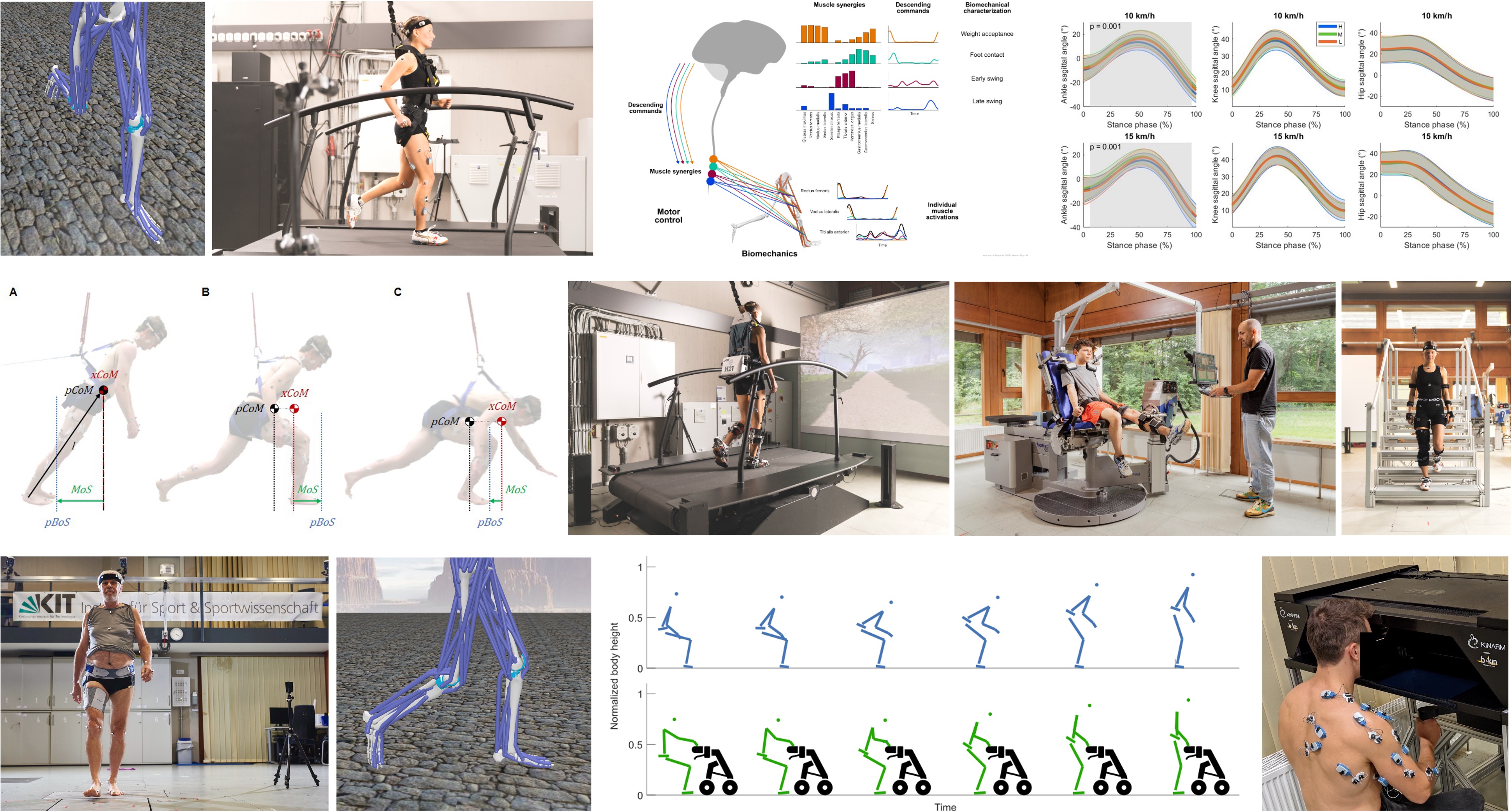Our research is driven by the interest in human movement, which is an important part of life, as it ensures physical mobility and thus interaction with the environment. Against this background, the aim of our research is to understand the functioning of human movement, i.e. the interplay between the nervous system and the musculoskeletal system, that enables coordinated movement behavior. Of particular interest to us is, how training protocols need to be structured and modern technologies (e.g. running shoes, orthoses or exoskeletons) need to be designed to improve this interplay and thus motor performance in everyday life and sport as well as in prevention and rehabilitation. Our research focuses on the following areas: (1) control and biomechanics of human movements; (2) effects of training on the control and biomechanics of human movements; (3) effects of technologies on the control and biomechanics of human movements; (4) performance diagnostics.
In the four research areas mentioned above we work as an interdisciplinary team that combines various strands of research from sports science, neuroscience, medicine, computer and engineering sciences with the practical sports experience of our team in the context of experimental studies. This is made possible by the different scientific disciplines (including sports science, computer and engineering sciences, mathematics and physics) that our team members have studied, as well as our practical experience as athletes and coaches in various sports.
At the IfSS we represent the natural sciences of sport (motor control, biomechanics, training science, sports informatics & engineering) and are anchored in the research structures of the KIT through our membership in the KIT centers “Information - Systems - Technologies” and “Health Technologies”.
Artificial intelligence can be used to predict how well patients with hip osteoarthritis will be able to walk again after surgery: Researchers at the IfSS have developed an AI model to analyze movement patterns. Analyzing gait biomechanics also makes it possible to tailor rehabilitation to each individual patient. In the future, it may be possible to apply the approach developed for the hip joint to other joints.
Cagla Kettner has published an article titled “The Effects of Shoe Sole Thickness on Running Style and Stability During Downhill Running at Different Speeds” in the European Journal of Sport Science.
Michael Herzog has published an article titled “Changes in muscle synergy structure and activation patterns underlie force field adaptation, retention, and generalization” in the Journal of Neurophysiology.
Prof. Stein was a guest on the “Bergwelten-podcast”. In the episode “Hiking with a motor: is it still a sport?”, he talks about the use of exoskeletons for hiking (in german).
We congratulate Michael Herzog on his dissertation titled “Coordination and Adaptation of Human Movements in Human-Robot Interaction.”
As part of a joint project between Professors Sell and Stein, Batin Yilmazgün published the article “Prediction of 3D ground reaction forces during various movement tasks: a study using convolutional neural networks to compare different configurations of inertial measurement units” in the Journal of Biomechanics.
Hannah Steingrebe has published an article entitled “Hip and trunk biomechanics and dynamic balance during steady-state stair walking in people with mild-to-moderate hip osteoarthritis” in the “Journal of Biomechanics”.
Michael Herzog has published an article entitled “The central nervous system adjusts muscle synergy structure and tightly controls rollator-supported transitions between sitting and standing” in the “Journal of NeuroEngineering and Rehabilitation”.
The contribution “Changes in center of mass variability and its structure with different shoe stack heights at different running speeds” by Cagla Kettner was accepted as an oral presentation at the “17th Biennial Footwear Biomechanics Symposium” of the “International Society of Biomechanics”.
The contributions of Melina Beyerlein, Cagla Kettner and Bernd Stetter were accepted as oral presentations at the “XXX Congress of the International Society of Biomechanics”.
Cagla Kettner has published an article entitled “The effects of different shoe stack heights and running speeds on full-body running coordination: An uncontrolled manifold analysis” in the “Journal of Biomechanics”.
Cagla Kettner and Michael Herzog will present current results from their research projects at the 18th annual conference of the DVS-section “motor behavior” from 19.03.-21.03.2025 at the TU Munich.
Cagla Kettner has published an article entitled “The effects of running shoe stack height on running style and stability during level running at different running speeds” in the journal “Frontiers in Bioengineering and Biotechnology”.
Hannah Steingrebe, PhD student of Prof. Stein and Prof. Sell, has published an article titled “Mild-to-moderate hip osteoarthritis and hip bracing influence hip and knee biomechanics during 90° turns while walking” in the journal “Clinical Biomechanics”.

